Game Warden 2.0
November – December 2018
Nevada’s Department of Wildlife protects all aspects of the Silver State, on and off the water.
BY CHRIS LEWIS
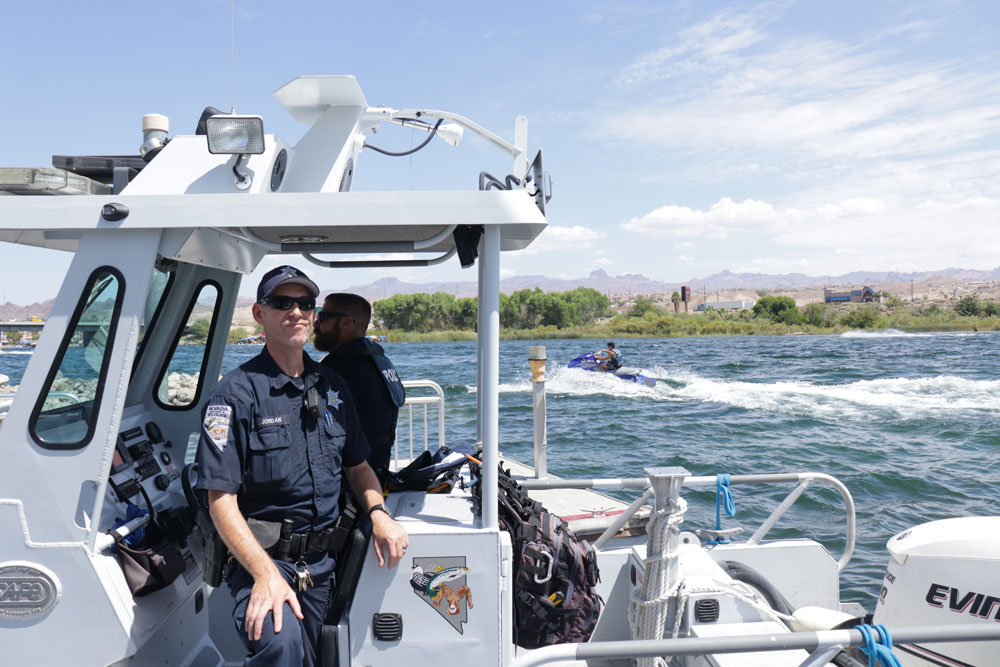
It’s the start of Labor Day weekend in southern Nevada. Along the state’s highways in the morning hours, a long procession of vehicles travels in a single direction—many with boats and jet skis in tow. They come from California, Arizona, and parts of the Silver State itself. And at the southernmost tip of the state sits the city of Laughlin right on the edge of the Colorado River with its various resorts and riverside casinos. For many, it’s the end of summer and the chance to spend one last long, carefree weekend on the water and under the sun.
By early afternoon, a clear rippling river is transformed into an aquatic Autobahn as hundreds of jet skis (and a few boats) roar up and down a 2-mile stretch of waterway that extends from Harrah’s Laughlin to Davis Dam.
Traveling along is the occasional hotel ferry and a few law enforcement patrol boats aiming to keep the peace, and most importantly, keep everyone safe. Bullhead City has one patrol afloat, but carrying the share of the load are the game wardens of the Nevada Department of Wildlife (NDOW).
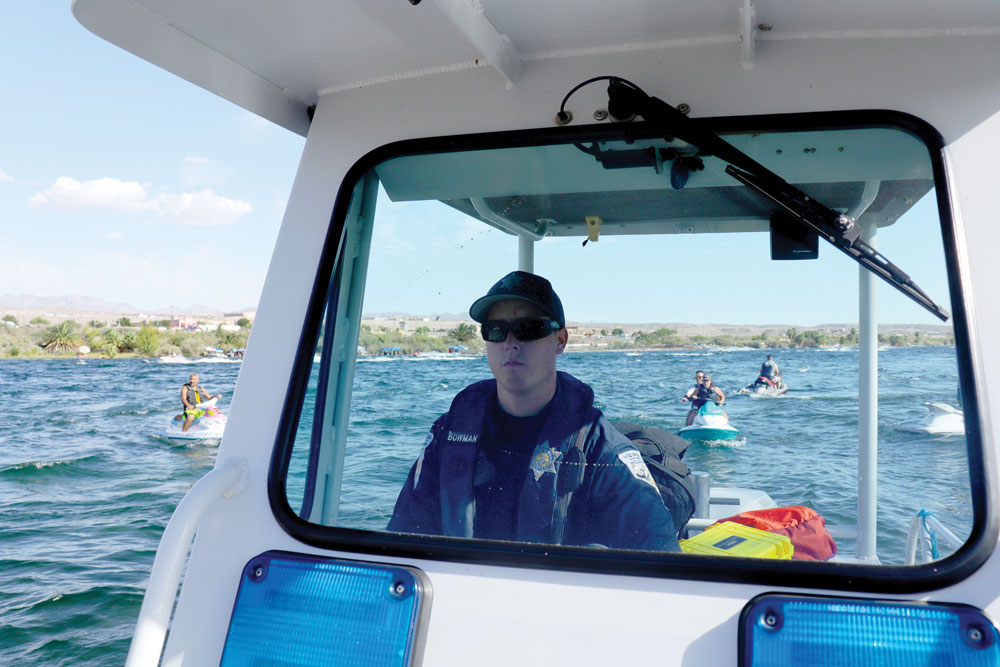
BEHIND THE BADGE
Zach Bowman, 26, is one of those wardens patrolling the river in a grey SAFE speedboat. Zach may carry the demeanor of a cop, but if you were to catch him out of uniform, the fact he carries a badge probably wouldn’t occur to you. He resembles a more fit Richie Cunningham from “Happy Days” with a much deeper tan because of all the days spent in the sun.
As I ride along with Zach, my eyes widen to a surreal scene on the water as jets skis zoom back and forth in both directions.
Within a few minutes, he hits his lights and siren and chases down a tall, skinny male, who looks like he’s still in his teens, after his jet ski zips across the back of Zach’s wake within feet of his patrol boat.
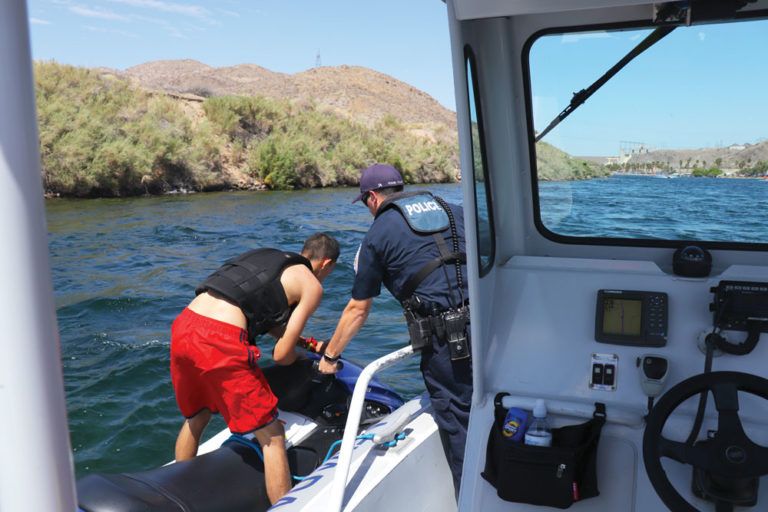
He cites him for reckless operation, but only after checking his jet ski’s registration and condition of his onboard fire extinguisher, which is standard procedure. “By crossing behind me like that, he had no way of seeing oncoming traffic,” he says.
Zach has every good reason to take his responsibilities seriously. Just this summer alone, he personally has been on the scene of 14 boating accidents, including one fatality.
He’s been to his share of funerals, he tells me. He even came across a traffic fatality on a desolate road near Elko years before becoming a game warden. So, this wasn’t something he felt he was unprepared for. But still, he admits, witnessing what he did that day stays with you.
KEEN EYE
For Zach, and all the game wardens patrolling Nevada’s lakes and rivers, the stakes are high. This isn’t the water version of “Paul Blart: Mall Cop.” Nevada’s game wardens—among many other responsibilities—patrol the waterways much like Nevada Highway Patrol watches over the freeways.
In other words, Zach isn’t out to stifle someone’s good time. He understands everyone is out on the river to blow off steam and have some fun. It’s just that he’s seen how quickly a great time turns into misery. Every time he’s on the water, he witnesses actions by the foolish or inexperienced that just an inch one way or the other could have been tragic for not only the person committing the act but others around them. And too often, he sees the results when it does.
Patrolling the Colorado is a day spent assisting those who may have misjudged the power of the river and maintaining a presence to keep the reckless in check, among other things.
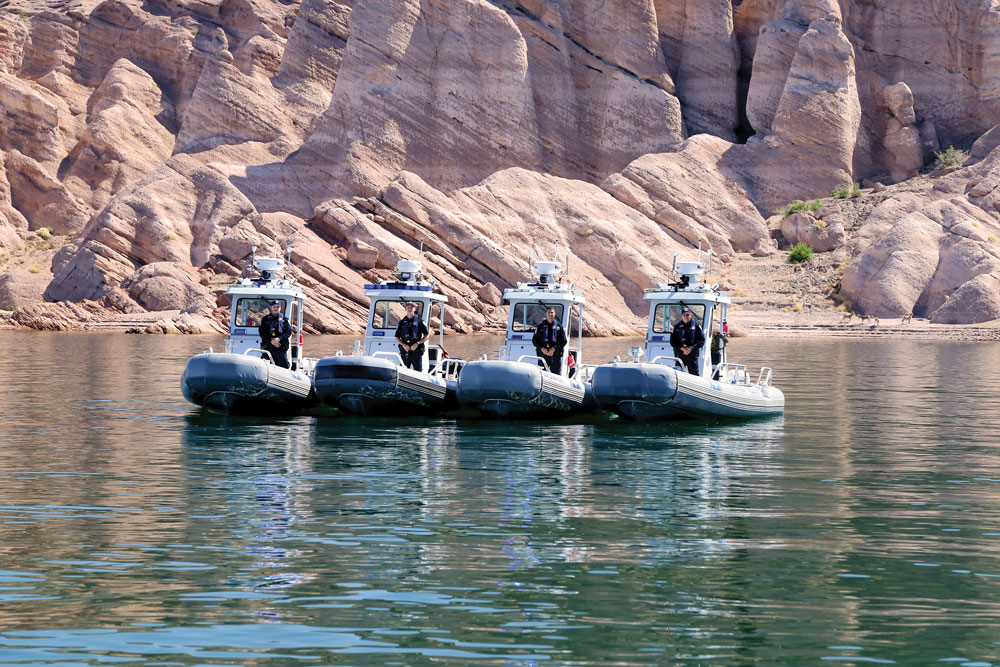
Photo: Nevada Department of Wildlife
No more than two hours after issuing his first ticket, a middle-aged man and his young son flag us down on their jet ski in a hurry. He yells out his wife and daughter were involved with a hit-and-run while on their jet ski, and then the middle-aged man takes off. Zach must gun the engine to catch up and wave down the middle-aged man, who has darted off, apparently to hunt down the hit-and-run driver. “Is anyone hurt?” Zach asks. “What did the person look like?” “What color jet ski?” “Where are your wife and daughter?” Zach is able to coax the man to come back so they can find his wife and daughter and check on their condition. As we head back, Zach provides a description over his radio of the hit-and-run suspect. Eventually, we’re able to track the man’s family down. The woman sits behind her daughter on their jet ski and holds a broken side mirror in her hand. The daughter looks no older than 13 and grimaces in obvious pain. She says the suspect slammed into her leg when they were sideswiped. Zach is able to get them over to the boating ramp so he can check on her. He sits her down and calls for an ambulance before taking statements. An ambulance and another NDOW patrol boat arrive in minutes and the paramedics now attend to the girl.
I can’t help but think what he told me a short while ago, “It’s kinda slow today.”
OFF THE WATER
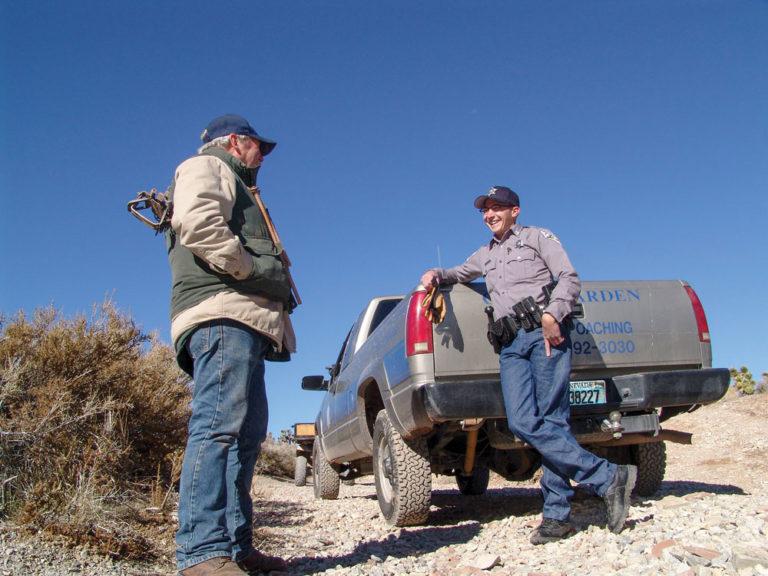
There are a lot of things that keep Chief Game Warden Tyler Turnipseed up late at night, the least of which is how just 31 field-level wardens when they’re fully staffed (they’re never fully staffed), three lieutenants, four captains, and himself are responsible for the entire state. Compare that to California, which has almost 500 wardens, and Utah, which has anywhere between 150-200, and Nevada has fewer game wardens per square mile than any state in the country, apart from Alaska (they patrol by plane).
His department is 97 percent self-funded through the sale of licenses and hunting tags. Each year, Nevada may sell around 30,000 big-game tags. Utah will sell 10-20 times that amount. Nevada may not have the number of hunters Utah or other states have, but the other states’ wardens don’t have as many miles to cover.Back when Chief Turnipseed was Winnemucca’s game warden, before taking the helm of the department in 2014, he would patrol an area the size of Massachusetts by himself. “Now, my patrol area is within these four white walls,” he says, referring to his office in Reno.
But that’s not really what concerns him. The times are changing, and with it, come a series of other challenges. Poaching is different today than it was years ago. It’s no longer about putting food in the freezer for an upcoming winter. Today, poaching is more trophy-oriented. Often, you’ll find deer or elk with their heads cut off, while the rest of their bodies are left to rot under the sun.
The thought of one of his wardens walking into an illegal marijuana grow is also something that concerns him.
But the job has always come with its set of dangers. Statistically, game wardens are seven times more likely to be assaulted by a deadly weapon than any other law enforcement officer. Nevada has never lost a game warden in the line of duty and Chief Turnipseed is confident his people receive the necessary tools and training to keep it that way.
HELP NEEDED
What really keeps the chief up late at night is the amount of turnover in his department. Nineteen wardens in the last five years quit only after a few years on the job. He has a lot of people with more than 15 years of experience and a bunch with less than three years, like Zach. What concerns him is the lack of people in the middle—those that can serve as a training officer, or at the very least, serve as a mentor.
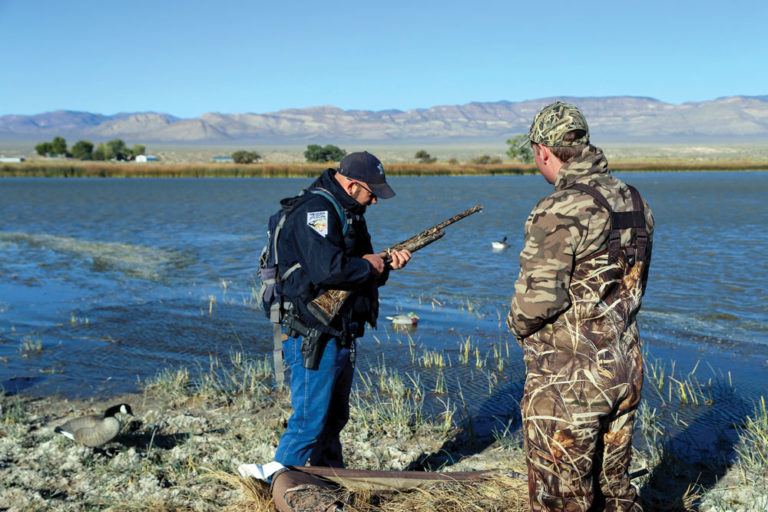
Twenty years ago, when Chief Turnipseed became a warden, those that joined knew it was a lifestyle and were in it for good. The job came with an unrivaled amount of autonomy and variety. You could work 12 hours one day and then two the next. Sometimes, you would start patrol at 5 a.m. and the next day at 4 p.m.
“Got to mix it up, especially in the small rural areas,” the chief says. “You don’t want people to figure out ‘ok, our local game warden always works these hours.’”
Plus, the job was seasonal to a certain degree, depending on where you are stationed. The day-to-day, season-to-season is different for the warden in Elko compared to the warden in Laughlin. Often, wardens would do boat patrols during the summer; then dove hunting season in September; then deer, elk, and other big game in October. November would bring trapping season (bobcat pelts can fetch up to $800 per pelt, with its own set of regulations), and then by Memorial Day the cycle would start again.
“By the time I was sick of one activity, it was time to move into the next one,” the chief says.
But even more important than the variety was the freedom. There were days, the chief says fondly, that he would head out in his truck with his dog and sleep wherever he ended up that evening.
Today, the chief is not so sure this new generation of applicants has that type of commitment. Too often, someone will transfer to another federal agency or to a local department that pays more only after a few years.
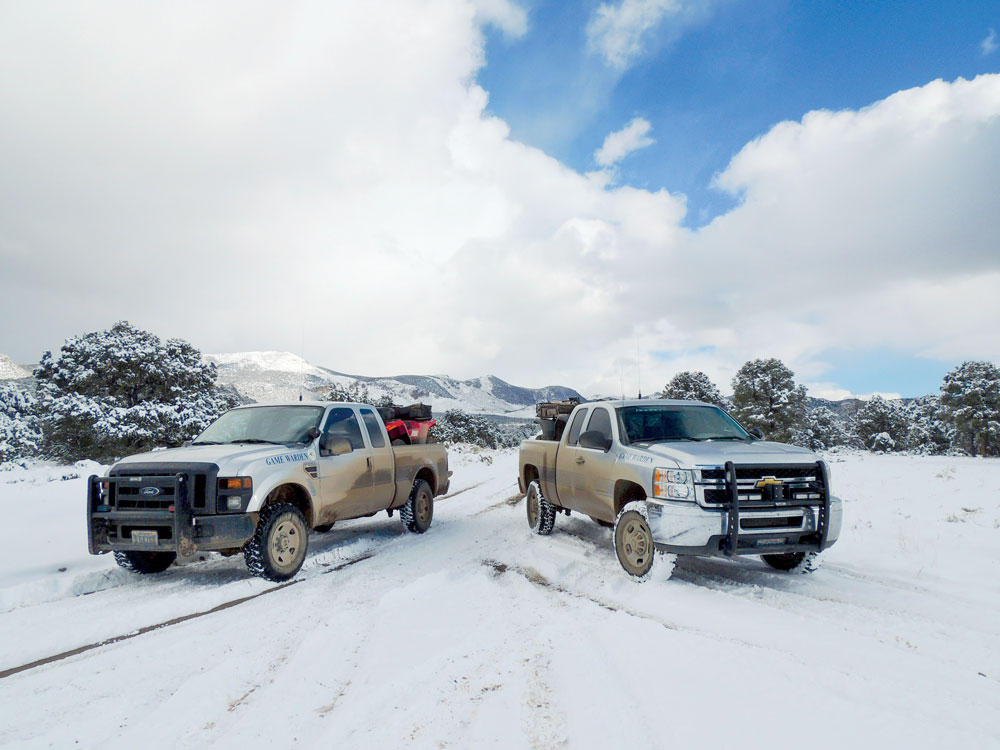
“I don’t blame them for that. If they want to go make more money to support a family by working for another agency, who am I to question that?” he says.
KEEPING MOTHER NATURE SAFE
But it was that love of the outdoors and an attraction to the lifestyle the chief describes that drew Zach into the life of a game warden. He grew up hunting, fishing, and riding ATVs in Reno and Fallon.
While applying for a hunting license one day when he was 18, he happened to come across a recruiting leaflet for NDOW in a revolving brochure stand. “Become a game warden” it said; he could see himself doing that, he thought.
After graduating from University of Nevada, Reno with a degree in criminal justice, he applied to only one agency.
While going on ride-alongs with game wardens when he was attending college, he was constantly told, “you know this is law enforcement, right?” In other words, the job entailed a lot more than just hiking through the woods searching for poachers.
When Zach became a game warden almost two years ago and was assigned to southern Nevada, he knew water patrol would be a big part of his duties, but he didn’t know it would be this big.
“Water patrol is our main mission,” he says.
He can’t help but admit he’s happy the end of boating season is near. He’s looking forward to hunt patrol and trapping season. Those responsibilities require a different mentality. While you’re on the water, your head is on a swivel as you constantly sift through all the noise trying to prevent accidents before they happen or helping those after.
Hunt patrol is different. You’re out talking up hunters and making contacts—maybe to come across a person out for the wrong reasons, maybe to develop rapport with someone who could provide a tip to a crime.
KEEPING US SAFE
But that’s for later. Right now, it’s all about boat patrol. Yes, Zach would rather be on land, but he knows this experience can’t be beat. He’s well-aware that what he’s seen and learned this boating season will make him a better game warden in the long run.
The paramedics have cleared the young girl who was involved in the jet ski accident, who although still appears a bit shaken, is walking normally and is no longer in obvious pain. Information has been gathered, photos have been taken, and there are no serious injuries. It’s time to move on.
“The day’s not even halfway over yet,” Zach says to me.
GET OUTDOORS
Nevada Department of Wildlife
OPERATION GAME THIEF
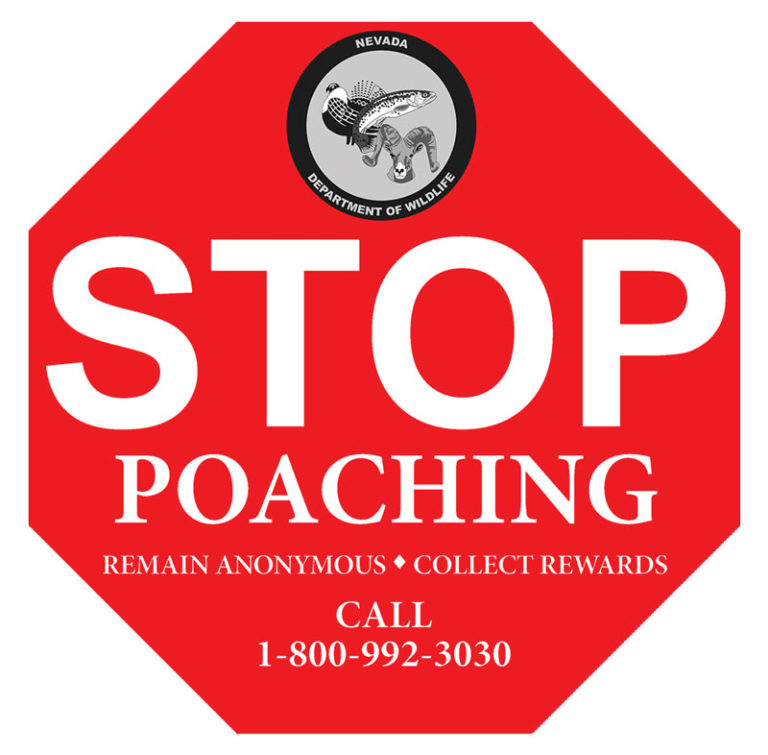 Operation Game Thief (OGT) was established to protect Nevada’s diverse wildlife resources, which ultimately belong to you. Together we can protect Nevada’s wildlife for future generations.
Operation Game Thief (OGT) was established to protect Nevada’s diverse wildlife resources, which ultimately belong to you. Together we can protect Nevada’s wildlife for future generations.
OGT provides a confidential, easy, and effective way for you to report wildlife violations to the Nevada Department of Wildlife, 24-hours-a-day, 7 days a week. And, just like Secret Witness, it’s confidential—you can remain completely anonymous.
If you provide information, you’ll be assigned a unique case number, which allows you to obtain status reports on the case.
The number also allows for eventual collection of a reward if offered.
Call 1-800-992-3030 to report a wildlife violation. —Information
provided by ndow.org


